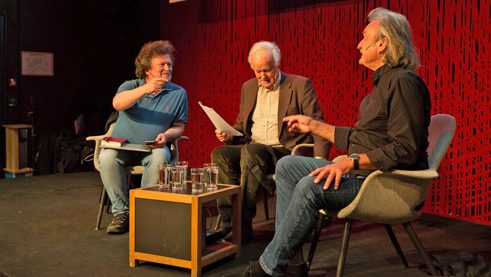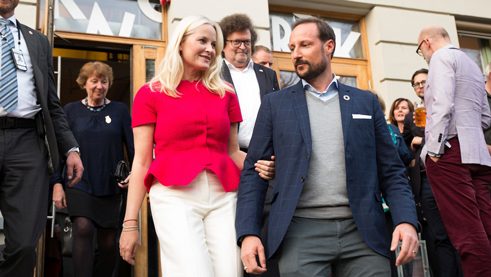German-Norwegian Literature Festival “On the Way to Frankfurt”
The Blue Sofa Phenomenon

The influence of traditional literary criticism on the book market is dwindling. Entertainment rather than analysis is in demand. At the German-Norwegian literature festival On the Way to Frankfurt, the question arose whether cultural criticism was facing a crisis.
A big crowd showed up this Saturday afternoon at Oslo’s Litteraturhuset (House of Literature) for the Austrian writer Christoph Ransmayr’s appearance at the German-Norwegian literature festival. Ransmayr made a name for himself in Norway with his first novels, published in the late 1980s, The Terrors of Ice and Darkness and The Last World, and yet regular translations of his new books are not guaranteed. When the moderator, Norwegian writer Erik Fosnes Hansen, introduces Ransmayr’s translator Sverre Dahl to the stage, Hansen first talks about how Dahl translated Ransmayr’s most recent 2016 novel Cox oder Der Lauf der Zeit on his own initiative and without any commission or payment. Now the book could “perhaps” be issued in Norway in autumn; at least a publisher has been found. Ransmayr briefly interjects that a “perhaps” would directly raise the question, say, in China of “in what century?” In any case, he suggests that fifty percent of the royalties should go to Dahl.
 The Austrian writer Christoph Ransmayr (right) speaking with Erik Fosnes Hansen (left) and Sverre Dahl (centre)
| Photo: Karina Gravdahl
The Austrian writer Christoph Ransmayr (right) speaking with Erik Fosnes Hansen (left) and Sverre Dahl (centre)
| Photo: Karina Gravdahl
Uneven interest
This translation story was more a marginal note on the podium, which otherwise revolved exclusively around the Austrian writer’s literature, and yet it is indicative of the little-pronounced interest of Norwegians in German-speaking contemporary literature. Whether on the terrace outside the Litteraturhuset, whether in discussions in the halls or at the opening of the festival on Friday evening in the presence of the Norwegian Crown Princess Mette Marit, mention was often made of how successful Norwegian literature was in Germany – for example books by Karl-Ove Knausgård, Maja Lunde or Jo Nesbø – and how many books from Norway are being translated into German for the guest appearance at the upcoming Frankfurt Book Fair, namely 280. Conversely, not even 20 books are being translated from German into Norwegian this year, one of which is surprisingly Simon Strauss’s debut Seven Nights. Erik Fosnes Hansen therefore came up with the idea of hosting a German-Norwegian literature festival before the book fair to promote German-language literature in Norway – a novelty in the history of guest country appearances at the Frankfurt Book Fair. Co-organised by, among others, the Goethe-Institut, the Willy Brandt Foundation and the Norwegian Non-fiction Writers and Translators Association and with Erik Fosnes Hansen as director and curator of the festival, forty authors from the German-speaking world and fifty from Norway met on this last weekend of April for readings, discussions or over a cup of coffee or a glass of wine in the bars of the four-storey Litteraturhuset, the largest in Europe. Crown Princess Mette Marit and Crown Prince Haakon in front of the Litteraturhuset
| Photo: Karina Gravdahl
Crown Princess Mette Marit and Crown Prince Haakon in front of the Litteraturhuset
| Photo: Karina Gravdahl
Seeing changed reception behaviour as a new opportunity
The fact that the literature in the two languages is quite similar, also in how it deals with certain social and political developments, was repeatedly observed and heard. The same is true of the reception of literature. “Is art criticism facing a crisis?” was the title of a debate between the writer Theresia Enzensberger, literary mediator Thomas Böhm, the Germanist Henrik Keyser Pedersen and the literary critic and NRK radio journalist Knut Hoem. None of them agreed that there is a “crisis,” but all agreed on the diagnosis: The influence of traditional literary criticism on the book market is quite minor and hardly influences book sales. Moreover, its nature has changed enormously, in Germany as well as in Norway, not least because digitalisation has produced many new communication media such as podcasts and blogs. “Is art criticism facing a crisis?” was the subject of discussion between Helge Rønning, Knut Hoem, Theresia Enzensberger, Thomas Böhm and Henrik Keyser Pedersen (left to right)
| Photo: Karina Gravdahl
“Is art criticism facing a crisis?” was the subject of discussion between Helge Rønning, Knut Hoem, Theresia Enzensberger, Thomas Böhm and Henrik Keyser Pedersen (left to right)
| Photo: Karina Gravdahl